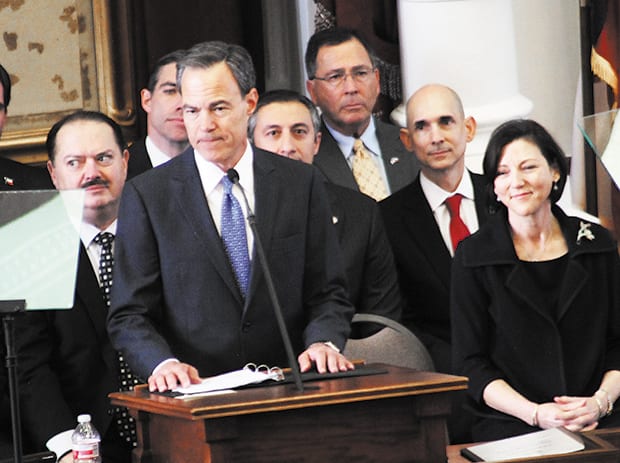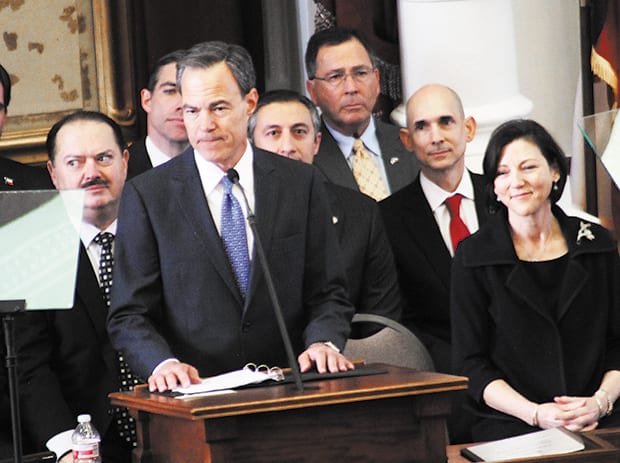Dan Patrick says his bathroom bill is a top priority this legislative session; House Speaker Joe Straus says otherwise

Rep. Joe Straus, R-San Antonio, shown during his swearing in last week as Speaker of the House, this week voiced his opposition to Lt. Gov. Dan Patrick’s anti-transgender “bathroom bill,” SB6. (David Taffet/Dallas Voice)
JAMES RUSSELL | Contributing Writer
james.journo@gmail.com
Some of Texas’ top officials refuse to back down from the bathroom battles currently dominating the legislative session. That is despite a budget shortfall, a broken school finance system and an “unconstitutional” Child Protective Services agency.
In fact, speaking to the Texas Association of Business on Tuesday, Jan. 18, Republican Attorney General Ken Paxton urged attendees to get behind Senate Bill 6. Commonly known as the “bathroom bill,” it would require people use bathrooms, locker rooms and other public accommodations according to their sex at birth and not gender identity.
Sen. Lois Kolkhorst, R-Brenham, authored the bill at Lt. Gov. Dan Patrick’s behest.
To Paxton, the largely skeptical crowd of business owners needs to listen to parents “concerned about the safety of their children.”
Speaker of the House Joe Straus, R-San Antonio, wasn’t having it.
The diplomatic, soft-spoken leader of the 150-member state House expressed grave concern about the bill. So far, only Rep. Matt Shaheen, R-Plano, has filed similar legislation.
“There’s been a lot of work put into our state’s economic success,” Straus said. “Contrary to popular myth, it is not a miracle. We want to continue that success and we want Texas to keep attracting the best and the brightest. One way to maintain our economic edge is to send the right signals about who we are.”
Residents of his San Antonio district have told him the bill could negatively impact not just their community but the state as a whole.
“Many people where I come from get concerned about anything that could slow down our overall job creating machine. They’re also watching what happened in North Carolina and they are not enthusiastic about getting that type of attention,” Straus said.
“So, I think we should be very careful about doing something that could make Texas less competitive for investments, jobs and the highly skilled workforce needed to compete.”
Straus also urged Republican Gov. Greg Abbott to articulate his opinion on the legislation.
“The governor’s opinion on this can make a big difference too,” Straus said.
Abbott last publicly spoke about the bill in December, saying he was unsure about the legislation and needed to look more into it. A week before, the Texas Association of Business rolled out its “Texas is Open for Business” campaign denouncing SB6 and other bills seen as potentially harmful to the LGBT community.
While few bills directly targeting the LGBT community have been filed, there’s still time. The last day for legislators to file bills for consideration is March 10, 2017.
Hardline social conservatives, who historically have opposed Speaker Straus and supported Lt. Gov. Patrick, will gather on March 16 for “Texas Faith and Family Day.” But to understand the difference between Patrick and Straus requires looking at the chamber’s priorities.
Straus this session has prioritized reforming CPS and the Robin Hood school finance system and promoting entrepreneurship.
The difference between the two chambers of the state legislature could not be starker. It’s not just the bathroom bill dividing the chambers.
Even their budget priorities are different: $8 billion different, in fact.
On Tuesday, Sen. Jane Nelson, R-Flower Mound, filed Senate Bill 1, the biennial state budget. According to a statement from Nelson’s office, the $103.6 billion budget includes additional resources for transportation, Child
Protective Services and mental health.
Straus’ office is markedly different, doling out $108.9 billion for the 2018-19 biennium.
“We put an emphasis on public education, child protection and better mental health care. The Members of the House, beginning with the Appropriations Committee, will now have the chance to shape this budget and decide how best to allocate resources during an economic slowdown,” Straus said.
“This is the first step toward producing a balanced budget that reflects the priorities of the Texas House and does not raise taxes.”
This article appeared in the Dallas Voice print edition January 20, 2017.

